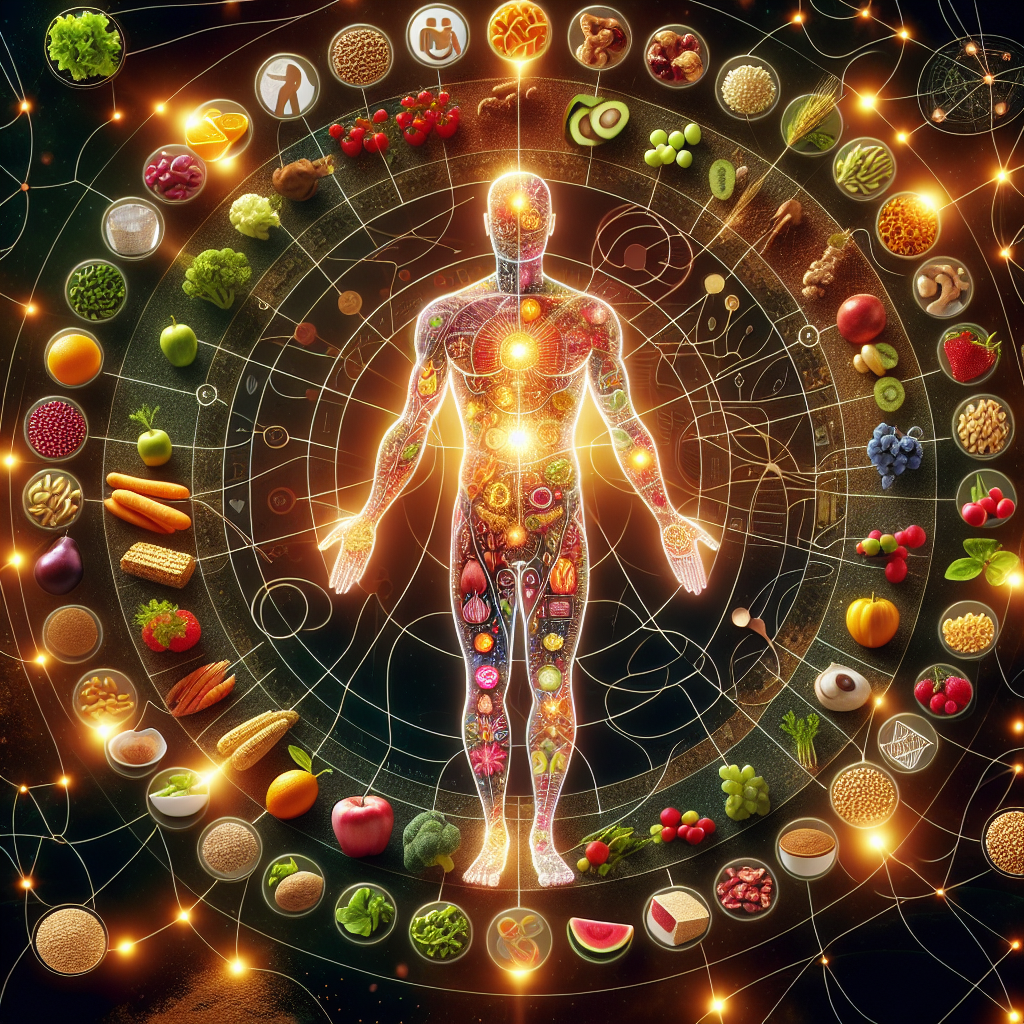Holistic Health Through Human Design and Nutrition

Discover the power of holistic health through human design and nutrition. Embrace a healthier, more vibrant lifestyle today. Visit www.myvibrantvitality.com now.
Exploring the Connection Between Human Design and Holistic Health
Holistic health is a comprehensive approach to wellness that considers the whole person—body, mind, and spirit. It emphasizes the connection of mind, body, and spirit, and the importance of balance in health and wellness. One of the ways holistic health can be achieved is through understanding and applying the principles of Human Design and nutrition.
Human Design is a system that combines elements of astrology, the I Ching, Kabbalah, Hindu-Brahmanic system, and quantum physics to provide a unique and specific profile for each individual. It offers a blueprint of our innate qualities and characteristics, and provides insight into our strengths, weaknesses, and potential challenges. It is a tool that can help us understand ourselves better, and guide us in making decisions that are in alignment with our true nature.
Nutrition, on the other hand, is a fundamental aspect of our physical health. It is the process by which we take in and utilize food substances essential for growth, repair, and maintenance of a healthy body. Good nutrition is vital for our overall well-being and can significantly influence our mental and emotional health.
The connection between Human Design and holistic health lies in the understanding that each individual is unique, and therefore, has unique nutritional needs. According to Human Design, there are different types of digestive systems, each with its own specific dietary requirements. For instance, some people are designed to eat small meals throughout the day, while others function best with larger meals at specific times. Some people thrive on a vegetarian diet, while others need a balance of plant and animal foods to maintain optimal health.
By understanding our Human Design, we can tailor our diet and lifestyle to suit our individual needs, leading to improved health and well-being. This personalized approach to nutrition acknowledges that there is no one-size-fits-all diet, and that what works for one person may not work for another. It encourages us to listen to our bodies and to eat in a way that supports our unique constitution.
Moreover, Human Design can also provide insight into other aspects of our health and well-being. It can reveal potential health challenges and vulnerabilities, and guide us in making lifestyle choices that support our overall health. For instance, it can provide insight into our sleep patterns, energy levels, stress response, and even our mental and emotional health.
In conclusion, the integration of Human Design and nutrition offers a holistic approach to health that considers the uniqueness of each individual. It encourages us to take responsibility for our own health, and to make choices that support our overall well-being. By understanding our Human Design and tailoring our diet and lifestyle accordingly, we can achieve a state of balance and harmony in our body, mind, and spirit. This approach to health and wellness empowers us to live in alignment with our true nature, and to thrive in all areas of our life.
In the pursuit of holistic health, it is essential to remember that it is a journey, not a destination. It is about making consistent choices that support our health and well-being, and being open to learning and growing along the way. With the guidance of Human Design and the principles of good nutrition, we can navigate this journey with greater ease and confidence, and enjoy a healthier, happier, and more fulfilling life.
Incorporating Nutrition into Your Human Design for Optimal Wellness

Holistic health is a comprehensive approach to wellness that considers the whole person, including physical, emotional, and spiritual aspects. One of the most intriguing aspects of holistic health is the concept of human design, a system that combines astrology, the I Ching, Kabbalah, and the chakra system to provide a unique blueprint of an individual’s life. This blueprint can guide us in making decisions that align with our true nature and purpose. However, to achieve optimal wellness, it is crucial to incorporate nutrition into our human design.
Human design provides a roadmap to understanding our unique energy patterns and potentials. It reveals our strengths, weaknesses, and inherent traits, helping us to navigate life more effectively. However, our physical bodies also play a significant role in our overall health and wellbeing. This is where nutrition comes into play. By understanding our human design, we can tailor our nutritional choices to support our unique energy patterns and enhance our overall health.
The human body is a complex system that requires a variety of nutrients to function optimally. These nutrients come from the food we eat, and their quality can significantly impact our health. For instance, consuming a diet rich in fruits, vegetables, whole grains, lean proteins, and healthy fats can provide the body with the nutrients it needs to function at its best. On the other hand, a diet high in processed foods, sugars, and unhealthy fats can lead to a variety of health problems, including obesity, heart disease, and diabetes.
Incorporating nutrition into your human design involves understanding your unique dietary needs and making conscious choices that support your overall health. For example, if your human design reveals that you have a high energy level, you may benefit from a diet rich in complex carbohydrates, which provide sustained energy. On the other hand, if your human design indicates that you are sensitive to stress, you may benefit from a diet rich in foods that support the adrenal glands, such as leafy green vegetables and lean proteins.
However, it’s important to remember that nutrition is not a one-size-fits-all approach. What works for one person may not work for another. This is why it’s crucial to understand your human design and tailor your nutritional choices accordingly. By doing so, you can support your unique energy patterns and enhance your overall health.
In conclusion, holistic health through human design and nutrition is a comprehensive approach to wellness that considers the whole person. By understanding our unique human design and incorporating nutrition into our lifestyle, we can achieve optimal wellness. This approach not only supports our physical health but also our emotional and spiritual wellbeing. It empowers us to make conscious choices that align with our true nature and purpose, leading to a more fulfilling and healthy life. So, take the time to understand your human design and make nutritional choices that support your unique energy patterns. Your body, mind, and spirit will thank you.
The Role of Human Design in Shaping a Holistic Approach to Nutrition
Holistic health is a comprehensive approach to wellness that considers the whole person—body, mind, and spirit. It emphasizes the connection of mind, body, and spirit, and the importance of balance in health and wellness. One of the ways to achieve holistic health is through human design and nutrition. Human design is a system that provides a blueprint of the unique configuration of our energy system. It offers profound insights into our psychology, along with strategies and techniques for making decisions that align with our true nature. When combined with a balanced approach to nutrition, human design can play a pivotal role in shaping a holistic approach to health and wellness.
Human design is a synthesis of astrology, the I Ching, Kabbalah, Hindu-Brahmin chakra model, and quantum physics. It provides a map, or a manual, that indicates how you are uniquely designed to navigate the world. The system is complex, but at its core, it is a tool for self-understanding and decision-making. It helps us understand our strengths, weaknesses, and how we interact with the world around us. This understanding can be instrumental in making choices that align with our true selves, including choices about what we eat and how we nourish our bodies.
Nutrition is a critical component of holistic health. The foods we eat can either support our health or contribute to disease. A balanced diet provides the nutrients our bodies need to function optimally, supports our immune system, and promotes overall wellness. However, what constitutes a balanced diet can vary greatly from person to person. This is where human design comes in. By understanding our unique design, we can make more informed decisions about what foods are best for our individual bodies.
For example, some people may thrive on a plant-based diet, while others may need more protein from animal sources. Some may need to eat small, frequent meals throughout the day, while others do best with fewer, larger meals. Human design can provide insights into these individual differences, helping us to understand why certain dietary approaches work for us while others do not. It can also help us understand our emotional relationship with food, and how our eating habits can either support or hinder our overall well-being.
Moreover, human design can provide insights into other aspects of our health as well. It can help us understand our energy levels, sleep patterns, stress responses, and more. By understanding these aspects of our design, we can make lifestyle choices that support our overall health and well-being.
In conclusion, human design offers a powerful tool for understanding ourselves and making decisions that align with our true nature. When combined with a balanced approach to nutrition, it can help us achieve holistic health. By understanding our unique design, we can make dietary and lifestyle choices that support our physical, mental, and spiritual well-being. This holistic approach to health and wellness recognizes that we are all unique, and that what works for one person may not work for another. It encourages us to listen to our bodies, honor our individual needs, and make choices that support our overall health and well-being.